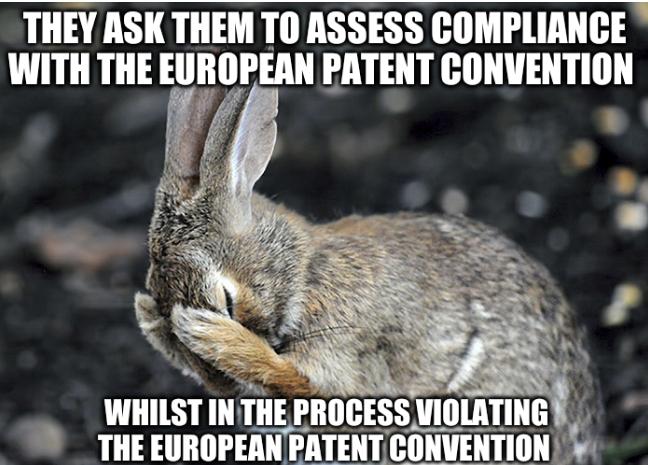

THE decision that was announced on Friday was rather weak. It doesn't quite apply retroactively and it does not deal with loopholes, having had its question (referral) watered down by the Office. This is in violation of the EPC and it serves to reaffirm the Boards' lack of independence. People have pointed this out in comments, but nobody actually investigated this. As usual, the media was a lapdog, not a watchdog. The same can be said about blogs that cover patents; they were sold to or infiltrated by patent litigation fanatics.
The EPO’s Enlarged Board of Appeal declared yesterday that plants and animals exclusively obtained by essentially biological processes are not patentable, contrary to a 2018 decision from the office’s Technical Board of Appeal that such products were eligible for patent protection.
The decision was the latest in a series of attempts over 10 years to clarify whether patent protection can be obtained for plants in Europe, and falls in line with the EPO’s guidelines from 2017 that excluded plants from patent protection.
In its opinion on case G 3/19 (Pepper), the EBoA held that under Article 53b of the European Patent Convention, the non-patentability of essentially biological processes for the production of plants or animals also extends to plant or animal products that are exclusively obtained by an essentially biological process.
To ensure legal certainty and to protect the legitimate interests of patent proprietors and applicants, the EBoA also ruled that the new interpretation of Article 53b would not have retroactive effect on European patents containing such claims that were granted before July 1 2017.
The interpretation will also not be extended to pending patent applications seeking protection for such claims that were filed before that date.
“I’m a bit surprised about this outcome from a purely legal point of view, but happy about it because this has been our business’s political position,” says Franck Coutand, former patent manager and current head of quality and safety at Limagrain, a plant breeder, in France.
The European Patent Office (EPO) concluded yesterday (14 May) that plants and animals exclusively obtained by essentially biological processes are not patentable.
Plants and animals that are produced only by "essentially biological processes" are not patentable, the European Patent Office has ruled, a decision that has been hailed as a victory against agribusiness giants while prompting a warning that "existing loopholes" still need to be closed.
In a 70-page opinion Thursday, the EPO's Enlarged Board of Appeal held that the European Patent Convention, which governs patents issued by the office, excludes plants and animals that are "exclusively obtained by means of an essentially biological process."
The appeals board's reading of the EPC does not apply to patents granted before July 2017 or pending...
"It says as much about the media as it says about the EPO."It's kind of sad in a way that nowadays IP Kat deletes comments that speak of EPO corruption or mention António Campinos and Benoît Battistelli. They're in effect helping the EPO's management cover up the abuses instead of covering abuses. Sophie Corke at the Litigation Kat even reassures us that the Kats in 2020 are little but a mouthpiece of highly corrupt EPO management (see bottom section).
In a similar vein, the other site founded by the founder of IP Kat (then sold) is still publishing sponsored spam as 'articles' and still chatting with patent trolls and judges like Rodney Gilstrap who welcome their abuse (example from a few days ago). This site is a think tank of bad actors. It's also a lobby for UPC, which died despite their lobbying. It says as much about the media as it says about the EPO. ⬆